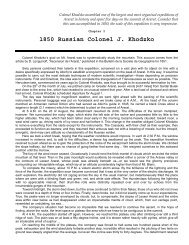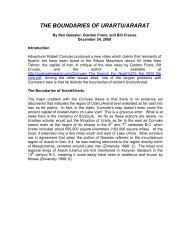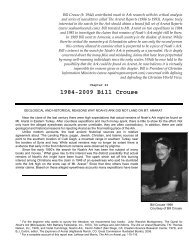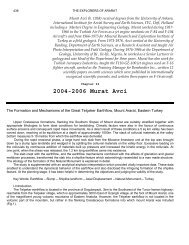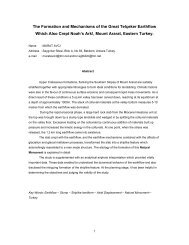1876 British Viscount & Ambassador James Bryce - Noah's Ark Search
1876 British Viscount & Ambassador James Bryce - Noah's Ark Search
1876 British Viscount & Ambassador James Bryce - Noah's Ark Search
Create successful ePaper yourself
Turn your PDF publications into a flip-book with our unique Google optimized e-Paper software.
148 THE EXPLORERS OF ARARAT<br />
which is perhaps hardly worth the knowing. In Eastern Russia and Siberia you acquiesce in the fact that there never<br />
was any history; the past is a blank, and must remain so. In Asia Minor, on the other hand, you are within the circle of<br />
Greek and Roman civilization; everybody, from Herodotus downwards, has something to tell of its cities and peoples.<br />
But Georgia, and the regions immediately round it, have been always the frontier land of light and darkness, a<br />
battlefield of hostile empires and religions; first of the Roman empire and the Persians, then of Christianity and fireworship,<br />
then of Christianity and Islam, then of Persians and Turks, lastly of Russia against both the Sultan and the<br />
Shah. One finds traces in the buildings and the art of the people of all these influences—of the Greek traders who<br />
frequented the markets of the Euxine; of the Byzantine emperors, who held sometimes more, sometimes less of the<br />
country, Justinian having pushed forward his garrisons as far as the Upper Kur and Heraclius as far down as Tavriz; of<br />
the Genoese, who monopolized the Black Sea trade in the later days of Byzantine rule, and had their settlements all<br />
round its coasts; of the Persians and Armenians, who came as conquerors or immigrants. There is a wonderful harvest<br />
awaiting the archaeologist here, and the laborers are still few.<br />
The Russians, as being the rulers and the most civilized, might be expected to be able to effect this, but it must be<br />
remembered that they are not very numerous, consisting only of the upper officials, of the soldiers, who are a transitory<br />
element in the population, and of some isolated settlements of dissenting peasants. Moreover, they are not thoroughly<br />
civilized themselves, and cannot impart what they have not got. Civilization in Russia is like a coat of paint over<br />
unseasoned wood; you may not at first detect the unsoundness of the material, but test it, and it fails. The Persians<br />
hate all Turks worse than they hate Christians, and may even, to the extent of their very limited power, side with<br />
Russia in the quarrel. The Tatars are a simple folk of shepherds, carriers, highwaymen, with no sense of the “solidarity<br />
of the Turkish race,” and no desire to draw the sword against the infidel. The Armenian peasantry of the Araxes valley<br />
seem to live much in the same way as their Tatar neighbors; their villages are little better, nor are they less illiterate.<br />
But one never hears of intermarriages nor any sort of rapprochement between them. Among the Christians<br />
themselves, the separate existence and strongly national character of the Armenian Church keeps its children apart<br />
not only from Protestant Germans, but from those who own the Orthodox Eastern faith. And it is really only where such<br />
a religions repulsion does not exist, as, for instance, between Russians and Georgians, that any social amalgamation<br />
goes on. There is no unity among these races, no common national feeling to appeal to, nothing on which a national<br />
kingdom could be based. Nothing, in fact, keeps them together but the Russian army and administration, and the<br />
loyalty of both these to the Czar is that which keeps Russia herself together, rising as it does almost to the dignity of a<br />
national worship.<br />
Chapter IV<br />
Tiflis is intolerably hot and close in summer. Add to this that the water is scarce and indifferent, and the dust truly<br />
Oriental, and it is easy to understand that summer is not the time to enjoy the Transcaucasian capital. So in summer,<br />
pretty nearly every one who can afford it, and can get free from his official duties, makes off to the hills. The court, that<br />
is to say, the Grand Duke, who is the sun of this system, and his attendant planets, the adjutants, go to Borjom, a<br />
charming spot among wooded mountains eighty miles to the west-northwest. In Tiflis, each of the principal trades has<br />
a street or streets, or a covered arcade in the bazaar, entirely to itself: thus in one street you find the dealers in arms,<br />
in a second the leather-sellers, in a third the jewelers, in a fourth the carpet merchants, in a fifth the furriers, on whose<br />
walls hang the skins of Caucasian bears and Hyrcanian tigers. The value of the old silver goods is well known; it is little<br />
use hoping for a bargain where so many Russian buyers are about, and where the sellers are mostly Armenian. The<br />
Germans have their own schools, far better than any which Russian organization produces; they are nearly all<br />
Protestants, with a wholesome Protestant contempt for their superstitious Georgian and Armenian neighbors. When<br />
there meets you a keener or more restless glance, you may be sure that it comes from an Armenian eye. The<br />
Armenians are a large and apparently an increasing element of the population, easily known by their swarthy<br />
complexion and peculiar physiognomy. They are the most vigorous and pushing people in the country, and have got<br />
most of its trade into their hands, not only the shop-keeping, but the larger mercantile concerns.<br />
Tiflis, whose native name, Tiblisi, is said to be derived from a Georgian word meaning hot, and to refer to the<br />
warm springs, is a place of some historical note. Tradition says that the first fort was erected here by a lieutenant of the<br />
Sassanid kings of Persia in A.D. 380, and that at it, seventy-five years later, the reigning monarch of Georgia, Vaktang<br />
Gurgaslan, founded a city, to which, in the beginning of the following century, his son Datchi transferred the seat of<br />
government, attracted by the hot sulphurous baths. Compared, however, to the antiquity of the former capital, Mtzkhet<br />
(twelve miles to the northwest), which was founded by a great-great-great-grandson of Noah, Tiflis appears a<br />
settlement of yesterday.<br />
Kajori is but a small place as yet, though with the growth of Tiflis it is likely to increase, and we visited only one<br />
other person there, General Chodzko (Khodzko), the distinguished engineer officer who in 1850 led a surveying party<br />
up Ararat. From him and his secretary, Mr. Scharoyan, I received a valuable suggestion for the climb, which we were<br />
thinking of trying, viz [namely] to keep to the rocks rather than trust the snow, and many injunctions on no account to<br />
ascend alone. In the evening we returned to Tiflis, fortified with all the recommendations that could be desired to<br />
convey us along the road into Armenia, for which, on the next day but one, we started accordingly.



